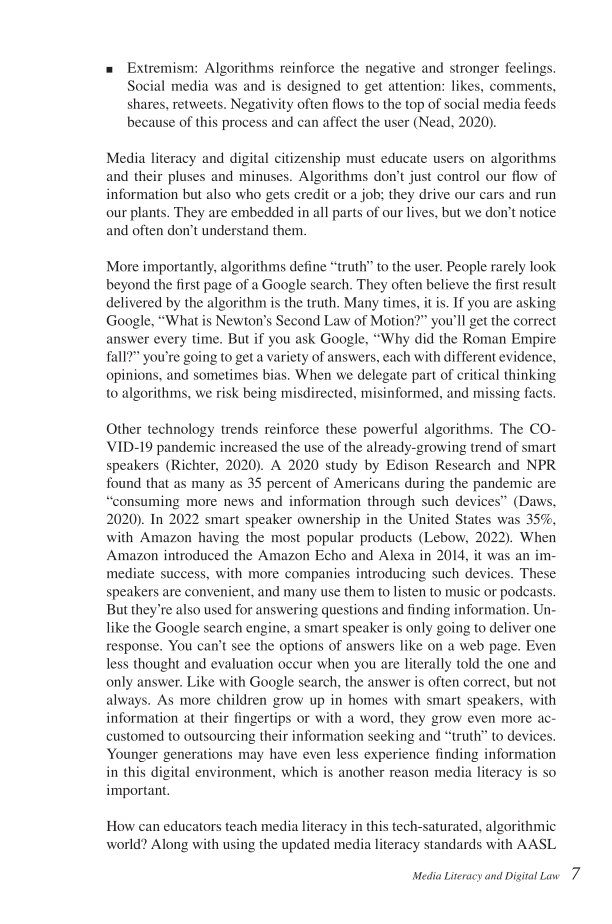Media Literacy and Digital Law 7 ■ Extremism: Algorithms reinforce the negative and stronger feelings. Social media was and is designed to get attention: likes, comments, shares, retweets. Negativity often flows to the top of social media feeds because of this process and can affect the user (Nead, 2020). Media literacy and digital citizenship must educate users on algorithms and their pluses and minuses. Algorithms don’t just control our flow of information but also who gets credit or a job they drive our cars and run our plants. They are embedded in all parts of our lives, but we don’t notice and often don’t understand them. More importantly, algorithms define “truth” to the user. People rarely look beyond the first page of a Google search. They often believe the first result delivered by the algorithm is the truth. Many times, it is. If you are asking Google, “What is Newton’s Second Law of Motion?” you’ll get the correct answer every time. But if you ask Google, “Why did the Roman Empire fall?” you’re going to get a variety of answers, each with different evidence, opinions, and sometimes bias. When we delegate part of critical thinking to algorithms, we risk being misdirected, misinformed, and missing facts. Other technology trends reinforce these powerful algorithms. The CO- VID-19 pandemic increased the use of the already-growing trend of smart speakers (Richter, 2020). A 2020 study by Edison Research and NPR found that as many as 35 percent of Americans during the pandemic are “consuming more news and information through such devices” (Daws, 2020). In 2022 smart speaker ownership in the United States was 35%, with Amazon having the most popular products (Lebow, 2022). When Amazon introduced the Amazon Echo and Alexa in 2014, it was an im- mediate success, with more companies introducing such devices. These speakers are convenient, and many use them to listen to music or podcasts. But they’re also used for answering questions and finding information. Un- like the Google search engine, a smart speaker is only going to deliver one response. You can’t see the options of answers like on a web page. Even less thought and evaluation occur when you are literally told the one and only answer. Like with Google search, the answer is often correct, but not always. As more children grow up in homes with smart speakers, with information at their fingertips or with a word, they grow even more ac- customed to outsourcing their information seeking and “truth” to devices. Younger generations may have even less experience finding information in this digital environment, which is another reason media literacy is so important. How can educators teach media literacy in this tech-saturated, algorithmic world? Along with using the updated media literacy standards with AASL
Document Details My Account Print multiple pages
Print
You have printed 0 times in the last 24 hours.
Your print count will reset on at .
You may print 0 more time(s) before then.
You may print a maximum of 0 pages at a time.

































































































































































































